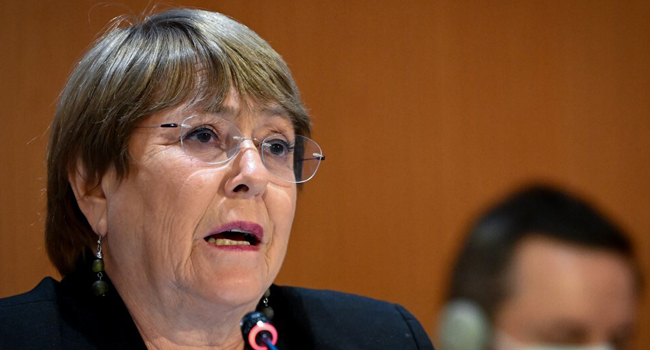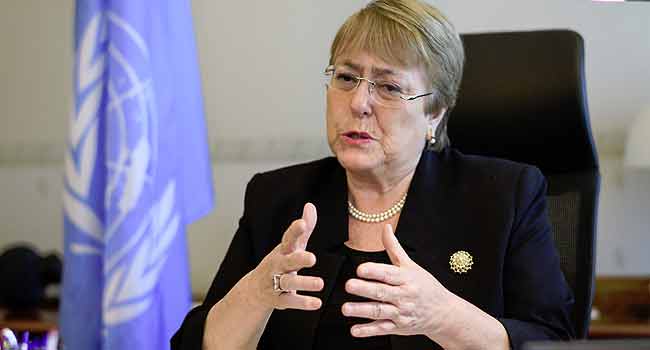
Russia’s widespread and indiscriminate attacks in populated areas of Ukraine are of “immense concern”, the UN rights chief said Wednesday, warning that they could amount to “war crimes”.
Speaking before the UN Human Rights Council in Geneva, Michelle Bachelet said that the entire population of Ukraine had been “enduring a living nightmare” since Russia launched its full-scale invasion five weeks ago.
“The lives of millions of people are in upheaval as they are forced to flee their homes or hide in basements and bomb shelters as their cities are pummelled and destroyed,” she said.
The UN High Commissioner for Human Rights called on Moscow to heed strong international appeals “and immediately act to withdraw its troops from Ukrainian territory.”
Thousands of people are believed to have died and millions have been displaced since the invasion began on February 24.
Presenting her latest report on the rights situation in the now war-ravaged country, Bachelet voiced particular concern over the “persistent use of explosive weapons with wide area effects in populated areas.”
– Cluster munitions –
Bachelet said missiles, heavy artillery shells and rockets and airstrikes were causing “massive destruction and damage to civilian objects.”
In addition, she said her office had received “credible allegations that Russian armed forces have used cluster munitions in populated areas at least 24 times”.
The office was likewise probing allegations that Ukrainian forces had also used such weapons, she said.
“Homes and administrative buildings, hospitals and schools, water stations and electricity systems have not been spared,” Bachelet said.
The UN rights office, she said, had verified 77 incidents in which medical facilities were damaged, including 50 hospitals.
Ten of the facilities were completely destroyed, she said, stressing that the actual numbers are “likely to be considerably higher.”
“Indiscriminate attacks are prohibited under international humanitarian law and may amount to war crimes,” Bachelet warned.
The UN typically does not categorically state that war crimes are being committed, since this can only be determined in a court of law.
But the UN rights chief stressed that “the massive destruction of civilian objects and the high number of civilian casualties strongly indicate that the fundamental principles of distinction, proportionality and precaution have not been sufficiently adhered to.”
– ‘Sheer terror’ –
The UN rights chief said her office had verified recorded 1,189 civilian deaths in Ukraine, including 98 children since February 24.
But she warned that the true toll was surely far higher, pointing out that her staff had little access to verify casualties in some of the hardest-hit areas.
Those include the besieged and devastated southern port city of Mariupol, where Bachelet said “people are living in sheer terror.”
Russian forces have encircled the city and their steady and indiscriminate bombardment has killed at least 5,000 people, but possibly as many as 10,000, according to one senior Ukrainian official.
“Civilians are enduring immeasurable suffering, and the humanitarian crisis is critical,” Bachelet said, pointing out that in many areas across the country people urgently need medical supplies, food, water and shelter.
“Above all, they need the bombs to cease, and the weapons to fall silent,” she said.
In besieged cities especially, Bachelet said her staff had noted “a significant increase in mortality rates among civilians.”
This, she said, “can be attributed to disrupted medical care coupled with conflict-related deprivation and stress.”
AFP



